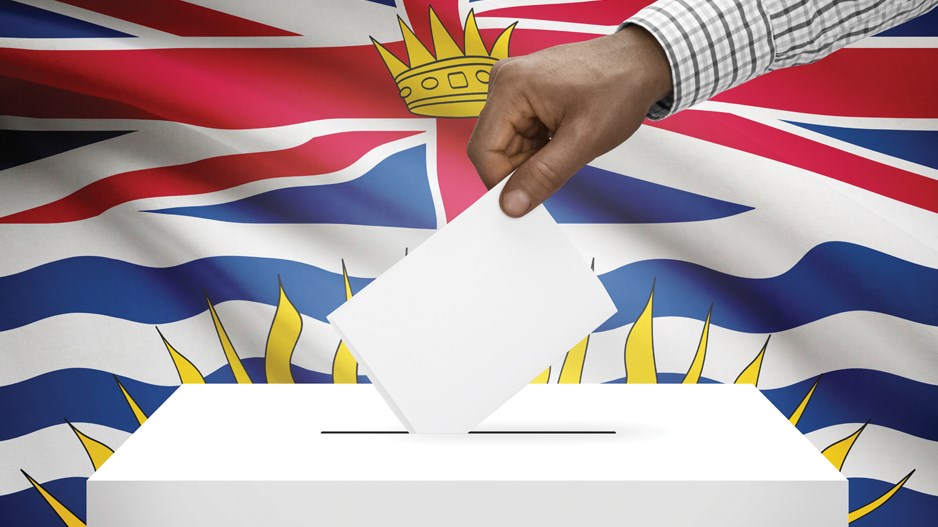The last provincial election that took place in British Columbia was unique in many ways. It was called early, it happened in the middle of a global pandemic, and it was the first one since 1991 to be held in a month that was not May.
In 2020, with concerns about COVID-19 still in the minds of many residents, more than three in 10 voters in British Columbia (31.4 per cent) sent their ballots through the mail. In the 2017 provincial election, only 0.3 per cent of votes were cast this way.
The proportion of residents who exercised their franchise on election day fell from 60.8 per cent in 2017 to 28.8 per cent in 2020. There was a bit of a shift in advance voting as well, with 35.4 per cent of voters in British Columbia choosing this option in 2020 (up from 30.2 per cent in 2017).
Research Co. recently asked British Columbians for later this year. We also asked how, and the results suggest a return to pre-pandemic behaviours. More than half (52 per cent) expect to cast their ballot on election day, just over one in five (21 per cent) will rely on advance voting and fewer than one in ten (eight per cent) intend to request a mail-in ballot.
We also queried British Columbians about six activities that are customary during political campaigns. Establishing actual contact with contenders is the least-preferred one. Only 29 per cent of residents say they will “definitely” or “probably” meet candidates who knock on their door – a proportion that drops to 25 per cent among those aged 55 and over.
About half of British Columbians say they will attend (or watch) a debate featuring candidates from their constituency (48 per cent) or attend (or watch) a debate featuring the main party leaders (52 per cent). Significantly larger proportions will “definitely” or “probably” review the background of candidates who are running in their constituency (65 per cent), read the platforms and policy positions of political parties on their websites (68 per cent) and watch, listen or read news about the campaign in the media (72 per cent).
It is not a surprise to see that the way in which debate performances are analyzed will be more important than the immediate reaction of individual voters to what is said. Reliance on the media during the campaign is high across all age groups: 72 per cent among those aged 18-34, 69 per cent among those aged 35-54 and 73 per cent among those aged 55 and over. There is no generation ready to effectively “tune out” media outlets.
The mindset of British Columbians is varied at this early stage. When asked to choose up to four feelings from a list of 10 to describe the upcoming election, the top response is “indifference” (31 per cent), followed by “enthusiasm” (25 per cent), “trust” (18 per cent), “fear” (15 per cent), “pride” (11 per cent), “anger” (also 11 per cent) and “joy” (10 per cent).
British Columbians aged 35-54 – a group that will be crucial to the chances of both the governing 小蓝视频 New Democratic Party (NDP) and the Conservative Party of 小蓝视频 – appear particularly despondent. They are ahead of the province-wide average on “indifference” (34 per cent) and “anger” (13 per cent), and below on “enthusiasm” (22 per cent) and “trust” (15 per cent).
Campaigns are supposed to move these numbers. We are yet to witness a powerful emotional connection towards any of the four provincial party leaders, three of whom are commanding a party into a campaign for the first time. Four recent examples outline how British Columbia’s election might unfold.
Seemingly unenthusiastic electorates can provide massive victories for incumbent governments if the alternatives are deemed unpalatable. In , Progressive Conservative Leader and Premier Doug Ford gained four points in the final week to reach an approval rating of 50 per cent before voters cast their ballots in 2022, giving his party another majority mandate.
The situation was different in , where two-thirds of residents aged 55 and over (68 per cent) approved of Francois Legault’s performance as premier and leader of the Coalition Avenir Québec (CAQ). Young voters gravitated between various options that never became a challenge to the governing party.
The case of in 2023 was similar. The province-wide approval rating for Rachel Notley of the NDP was better than the numbers posted by United Conservative Party (UCP) Leader and Premier Danielle Smith on the eve of the election (53 per cent to 47 per cent). Among voters aged 55 and over, Smith clearly had the upper hand over Notley (56 per cent to 42 per cent) and ended up winning what was essentially a two-party race.
In , the appetite for change was insurmountable for Heather Stefanson, the Progressive Conservative leader who had served as premier for less than two years and never recaptured the success of her predecessor. The NDP’s Wab Kinew headed to election day with clear leads in voting, approval and “Best Premier” – a trifecta that the 小蓝视频 Conservatives will undoubtedly hope to replicate.
Mario Canseco is president of Research Co. Results are based on an online study conducted from July 22 to July 24, 2024, among 801 adults in British Columbia. The data has been statistically weighted according to Canadian census figures for age, gender and region in British Columbia. The margin of error—which measures sample variability—is +/- 3.5 percentage points, nineteen times out of 20.





